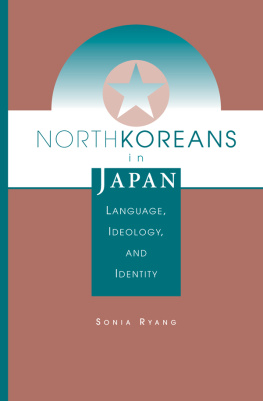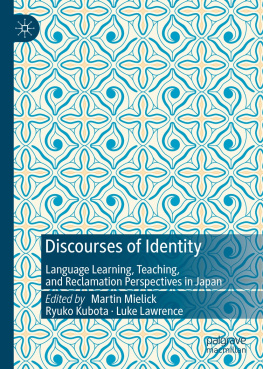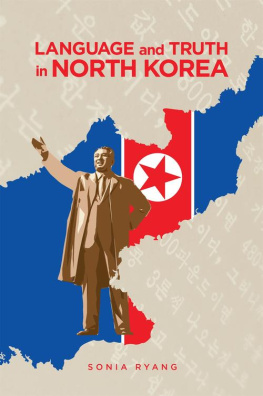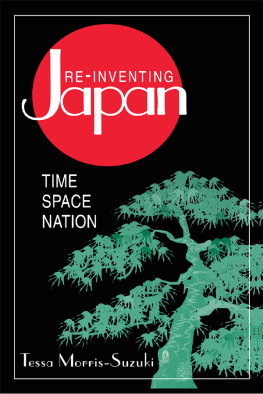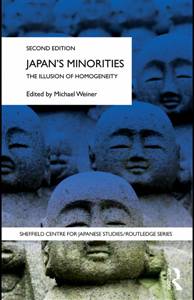North Koreans in Japan
Transitions: Asia and Asian America
Series Editor, Mark Selden
North Koreans in Japan: Language, Ideology, and Identity, Sonia Ryang
The Taiwan-China Connection: Democracy and Development Across the Taiwan Straits, Tse-Kang Leng
Trade and Transformation in Korea, 1876-1945, Dennis L. McNamara
Hidden Horrors: Japanese War Crimes in World War II, Yuki Tanaka
Encountering Macau: A Portuguese City-State on the Periphery of China, 1557-1999, Geoffrey C. Gunn
How the Farmers Changed China: Power of the People, Kate Xiao Zhou
From Plan to Market: The Economic Transition in Vietnam, Adam Fforde and Stefan de Vylder
Japanese Colonialism in Taiwan: Land Tenure, Development, and Dependency, 1895-1945, Chih-ming Ka
A New Woman of Japan: A Political History of Kat Shidzue, Helen M. Hopper
Vietnams Rural Transformation, edited by Benedict J. Tria Kerkvliet and Doug J. Porter
The Origins of the Great Leap Forward: The Case of One Chinese Province, Jean-Luc Domenach
Privatizing Malaysia: Rents, Rhetoric, Realities, edited by Jomo K. S.
The Politics of Democratization: Generalizing East Asian Experiences, edited by Edward Friedman
Our Land Was a Forest: An Ainu Memoir, Kayano Shigeru
The Political Economy of Chinas Financial Reforms: Finance in Late Development, Paul Bowles and Gordon White
Reinventing Vietnamese Socialism: Doi Moi in Comparative Perspective, edited by William S. Turley and Mark Selden
All photographs are by the author.
First published 1997 by Westview Press
Published 2018 by Routledge
711 Third Avenue, New York, NY 10017, USA
2 Park Square, Milton Park, Abingdon, Oxon OX14 4RN
Routledge is an imprint of the Taylor & Francis Group, an informa business
Copyright 1997 Taylor & Francis
All rights reserved. No part of this book may be reprinted or reproduced or utilised in any form or by any electronic, mechanical, or other means, now known or hereafter invented, including photocopying and recording, or in any information storage or retrieval system, without permission in writing from the publishers.
Notice:
Product or corporate names may be trademarks or registered trademarks, and are used only for identification and explanation without intent to infringe.
A CIP catalog record for this book is available from the Library of Congress.
ISBN 13: 978-0-8133-3050-1 (pbk)
ISBN 13: 978-0-8133-8952-3 (hbk)
The Young Pioneers trumpeters
Nursery school children learning Korean
Wall posters showing Korean and Japanese alphabets
The schools athletic festival is brought to a climax
Every classroom has portraits of the two Kims
A school poster carrying Kim II Sungs teaching
The schools athletic festival
The Young Pioneers choir 73 The rally against the U.S.-R.O.K. joint military exercise, the Team Spirit93
Participants in the rally calling slogans
North Korean flags leading the demonstration
The rally against the Team Spirit exercise
One of the slogans
Chongryun Koreans demonstrating in the heart of Tokyo
In the midst of the boom and bustle of contemporary Northeast Asia lies North Korea, its mask of monolithicity rarely lifted. A state that proclaims a unique polity centered on the cult of the leader and his family, it has teetered ever closer to the brink of economic collapse since the end of the Cold War.
Separated only by a narrow sea, North Korea and Japan differ in fundamental respects. Japan is of course an economic superpower. Japans largest foreign community, however, is Korean: the descendants of immigrants who tried to escape dire economic conditions during the long period of Japanese colonial domination of the Korean peninsula (19101945) or were pressed into Japanese military service or semiforced labor battalions during World War II. Despite the enormous contrasts between the two states and societies, ever since the division of Korea in 1945 and the foundation of separate North and South regimes in 1948, a large proportion of the Korean community in Japan has chosen to support North rather than South Korea. Yet few have any family connections there, most have little intention of visiting it, and virtually none would ever think of returning to what they claim as their homeland. Against considerable pressures either to assimilate by becoming Japanese or to adopt citizenship of the South Korean state, which has enjoyed diplomatic recognition from Japan since 1965, several hundred thousand people have opted to retain their North Korean identity and to support a nationwide system of Korean-language schools and banking and credit institutions. In declaring publicly their commitment to the most closed of regimes and isolated of states, they remain in effect stateless. This ability of Kim Il Sungs North Korea to retain the loyalty of so many overseas Koreans in Japan over half a century has long puzzled analysts.
This book is a study of people who live simultaneously in two worlds, in many respects fully integrated into Japanese society and indistinguishable from their Japanese neighbors but at the same time declaring themselves proud supporters of a state about which they know littlea truly imagined community. Sonia Ryang helps to explain how and why the North Korean community in Japan, a microcosm of a highly controlled society, continues to exist in the midst of postmodern, consumerist, and cynical Japan. She does so by focusing on the processes of political socialization and reproduction of core values in the construction of identity. She explores the ways in which the members of this community perceive themselves and, by complex code-switching linguistic practices, shift with what seems to be remarkable ease between identities according to social context.
It is not that accounts of the closed world of Chongryun (the General Association of Korean Residents in Japan, the organization that is the subject of this study) have not been written before. They have, but always by outsiders, journalists, or writers with political agendas either for or against the North Korean regime, who therefore told us either that all was well and Chongryun was a show window for the perfect society being constructed in North Korea, or else that all was far from well and that the organization of North Koreans in Japan was a potentially subversive group of fanatical adherents of Pyongyang helping to sustain an evil dictatorship. Sonia Ryang, however, writes as an insider, raised in a committed household, schooled from childhood in North Korean schools, and trained as a cadre, in a process and according to values in every way matching those practiced in Pyongyang, to serve Kim Il Sung as her leader. Furthermore, she does not reject these values in her book or follow the familiar path of the ideologically disillusioned, the apostate, or turncoat, although it is equally clear that she is no longer contained by the Chongryun organizational and disciplinary world. She writes primarily about Chongryuns human community, not the ideology. This is an account of the livedthe realcommunity rather than the imagined one. This unique account takes us into the minds of the cadres and teachers with whom the author worked, evoking with subtlety and sympathy their complex personal and psychological dilemmas. On reading this analysis of the processes of identity formation among North Koreans in Japan, readers may wonder whether in North Korea itself a similar practice of code-switching exists, allowing people to perform required public roles as parts of the monolithic structure surrounding the leader while simultaneously maintaining a different language and consciousness for their private worlds.

